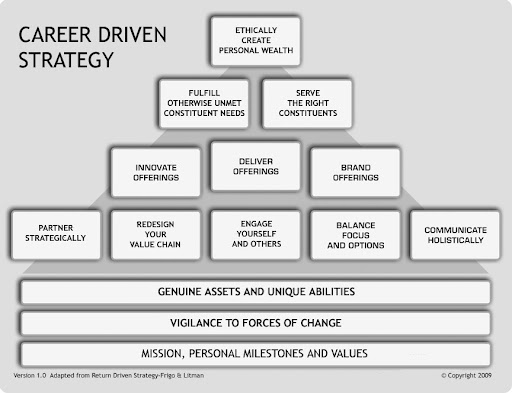This old dog has learned new tricks. Find out how a legacy giant reinvented itself!
| From the desk of Miles Everson: Hello! I’m thrilled to share another business insight with you in today’s edition of “Return Driven Strategy (RDS).” For those of you who are not yet familiar with this, RDS is a pyramid-shaped framework with 11 tenets and 3 foundations. When applied properly, these principles help businesses attain high levels of performance. Today, we’re going to take a look at one of tech’s legacy giants and how it’s positioned itself in today’s AI-dominated business landscape. Continue reading below to find out how this company pivoted itself to take advantage of the AI boom. |
This old dog has learned new tricks. Find out how a legacy giant reinvented itself! Founded in 1984, Dell Inc. made a name for itself by making and selling PCs directly to its customers, leading to its rapid rise in the 1990s. By 2001, the tech company became the largest PC vendor for the first time and remained a pure play hardware vendor until its acquisition of Perot System in 2008, which enabled it to enter the information technology (IT) services space. Throughout the 2000s and for most of the 2010s until early 2020s, Dell was primarily associated with the manufacturing and selling of PCs, laptops, and other related hardware. Despite being competitive throughout this period, Dell had been written off by both Silicon Valley and Wall Street because many analysts forecasted its decline due to cratering demand for PCs. While this slowdown in demand was very much true, it didn’t mean Dell was a sinking ship in a sector that’s no longer front and center when it comes to earnings potential. In fact, it’s a company that’s positioned to be a key player in today’s AI boom. A Giant in the PC Space
Many still associate Dell with its legacy as one of the world’s biggest PC manufacturers. This reputation was earned due to the fact that Dell entrenched itself in the consumer and enterprise segments of the PC market, as it sold not only desktops and related hardware, but also laptops targeted towards professional and gaming use. While the company still has a presence in the PC market, it’s no longer a pure play manufacturer. These days, Dell has rebuilt itself as one of the biggest players in data center servicing, offering solutions for data storage, service, cloud management, and technology infrastructure. So, how did the company go from a PC manufacturing giant into an under-the-radar player in today’s AI boom? By the late 2000s and throughout the 2010s, the PC market had matured, leading Dell to compete with other companies like Hewlett-Packard (HP) and Acer . Dell’s competitive advantage at the time centered around its ultra-lean manufacturing for desktop PCs and laptops. However, this advantage eroded since its competitors could match its manufacturing efficiency, effectively weakening price differentiation and pricing power for Dell. Once the 2010s rolled around, consumer preference switched from PCs and laptops to smartphones and tablets like Apple ’s iPad. As the PC market shrank, so did Dell’s market share and revenues. As a result, something had to change. Eventually, in 2013, a deal was struck to turn Dell into a private company. Making A Quiet Turnaround In 2015, Dell acquired EMC Corporation , a company that sold data storage, information security, virtualization, analytics, and cloud computing products for USD 67 billion. As part of the deal, Dell also took over EMC Corporation’s 81% stake in the cloud computing and virtualization company VMWare . Through this strategic move, the tech giant positioned itself to address the markets for scale-out architecture, converged infrastructure, and private cloud computing. In July 2018, Dell became a publicly traded company again, with its computer business and EMC operating under the newly created parent, Dell Technologies. The company would be further reorganized into three main business divisions: Client Solutions Group, Infrastructure Solutions Group, and VMWare. While these moves were publicized and gained significant attention, Dell continued to fly under the radar and was often dismissed as a small player by industry observers. However, this view was a mistake, as Dell’s pivot put it in a position to take advantage of the AI boom that started with the release of OpenAI ’s ChatGPT in 2022. According to Professor Joel Litman , the Chairman and CEO of Valens Research and Chief Investment Officer of Altimetry Financial Research , Dell is well-positioned to take benefit from the AI boom due to its transformation as a company that provides the infrastructure needed to manage large data volumes, train AI models, and deploy AI applications. While the market has yet to fully account for this transformation, there is no doubt that the company is positioned to thrive in the following years because of the strategic pivot it made years ago. Dell’s Newfound Success Through the Lens of RDS RDS’ third tenet— target and dominate markets —shows us the secret behind Dell’s newfound success. According to Professor Litman and Dr. Mark L. Frigo in the book, “Driven” : “To perform well, business managers need to choose the right industry and change industries when necessary. The managers might not control the industry’s economics, but they can certainly control whether or not to be in that industry in the first place.” This statement, when understood in the context of Dell’s reinvention, shows the importance of adaptability in the face of constant change. Industry shifts aren’t to blame for declining company performance as firms aren’t always stuck within an industry. This is because to reach and sustain high levels of performance, businesses and its leaders must pivot into other industries or types of business when needed. In the case of Dell, once the PC market matured and consumer sentiment shifted, it had to pivot in order to remain viable and competitive. By becoming a player in data storage and cloud computing, Dell reinvented itself as a company that’s poised to take advantage of today’s rapidly scaling AI market. — If you’re looking to gain a better understanding of Return Driven Strategy and Career Driven Strategy, we highly recommend checking out “Driven” by Professor Litman and Dr. Frigo. Click here to get your copy and learn how this framework can help you in your business strategies and ultimately, in ethically maximizing wealth for your firm. Hope you found this week’s insights interesting and helpful. EXCITING NEWS AHEAD The world of work has shifted, and there’s no going back. The barriers to entry have never been lower for talented professionals to work independently, and today’s massive external workforce is hardly a pandemic-produced fad. Business owners can only survive in the new work landscape by partnering with this deep talent pool. With decades of experience in both small-business entrepreneurship and executive management at PwC, I truly believe that the future of work is independent. With that, I’m happy to share with you that my book, co-authored with Walter Scott Lamb, is now available on Amazon! Free Birds Revolution: The Future of Work & The Independent Mind This new bestseller is an essential read for both independent professionals and corporate executives. Here, we provide educational and practical guides to unpack the ever-growing workforce and offer you crucial ways to become a client of choice. Click on the link above to order your copy. Let this bestselling book help you future-proof your career and organization in the new world of work. Stay tuned for next Tuesday’s Return Driven Strategy! FedEx Corporation (FDX) , originally Federal Express Corporation , is an American multinational conglomerate holding company focused on transportation, e-commerce, and business services. Learn more about this business case study in the context of RDS in next week’s article! |

Miles Everson
CEO of MBO Partners and former Global Advisory and Consulting CEO at PwC, Everson has worked with many of the world's largest and most prominent organizations, specializing in executive management. He helps companies balance growth, reduce risk, maximize return, and excel in strategic business priorities.
He is a sought-after public speaker and contributor and has been a case study for success from Harvard Business School.
Everson is a Certified Public Accountant, a member of the American Institute of Certified Public Accountants and Minnesota Society of Certified Public Accountants. He graduated from St. Cloud State University with a B.S. in Accounting.



